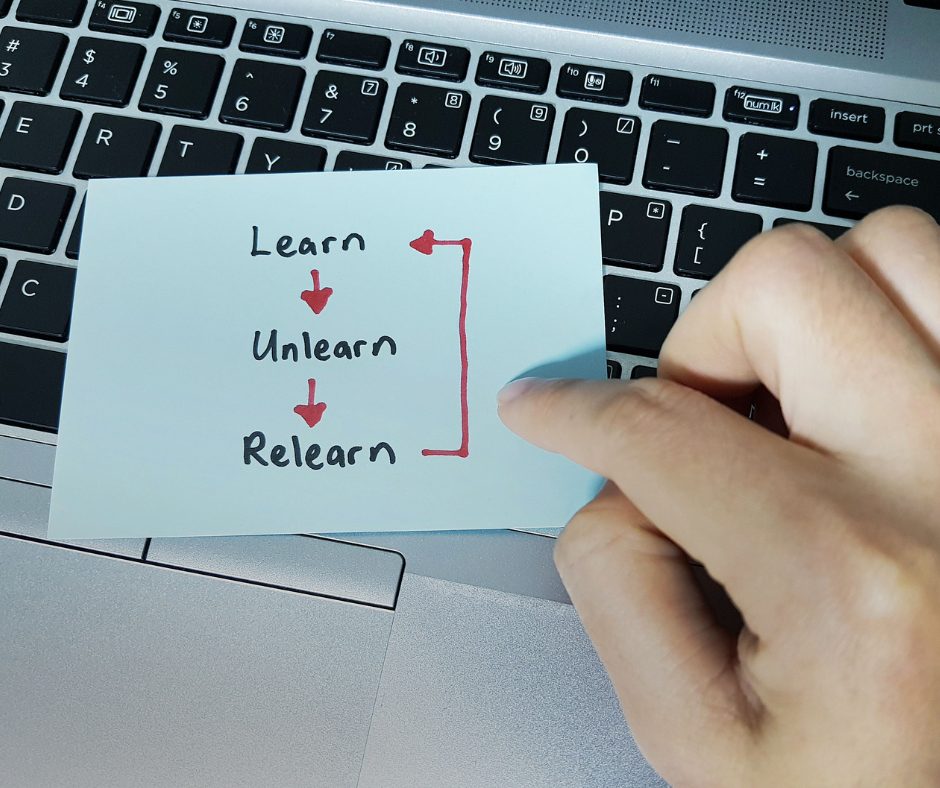In our journey towards personal and professional growth, the conversation often centres on the need for improvement and development.
This focus implies that we are somehow deficient or in need of fixing. And while it’s true that we all have areas, that could benefit from enhancement, the real challenge often lies not in what we need to learn, but in what we need to unlearn.
The Myth of Perfectionism
Take, for instance, perfectionism. Many, including myself, grapple with this mindset. Being a perfectionist is not an inherent trait. Perfectionism is learnt.
We learn that perfection earns praise, acceptance, and love. But what’s crucial to understand is that this pursuit of flawlessness is often more limiting than empowering.
The repercussions of perfectionism are far-reaching – it can lead to procrastination, as the fear of not being perfect paralyses action. It can also make one an unpopular stickler, overly critical and hard to please, both in personal and professional relationships.
The Logical Vs. Empathetic Balance
Consider another example: the overemphasis on logic. Logic is undeniably a valuable skill, but an overreliance on it can lead to a disconnect from our empathetic side.
In utilisng only our logical selves, we might inadvertently neglect our emotional intelligence. This doesn’t mean logic is bad; rather, it’s about finding a healthy balance between logic and empathy.
The consequences of lacking emotional intelligence are significant – it becomes hard to connect with others as people often bond over emotions, not just logic. Without this balance, relationships, both personal and professional, can suffer.
The Art of Unlearning
Unlearning is an art and needs patience and time. It requires us to challenge deeply ingrained beliefs and behaviours that, while once useful, no longer serve our growth.
For example, overusing strengths like planning and organising can backfire, turning us into control freaks, rigid and inflexible.
This process isn’t about discarding our strengths but about recalibrating them to better serve us in the right context and measure.
The Journey of *Laura: Unlearning for Balance
Let’s consider the story of Laura, a high achiever who found herself in a predicament common among successful individuals.
When Laura first approached me, she was feeling stuck, unable to recognise her own accomplishments despite an impressive career. Our conversations revealed a deep-seated belief: her success was inextricably tied to pushing herself to the brink of burnout.
Laura’s challenge was not unusual. She feared that letting go of her intense competitive drive would mean losing her edge and jeopardising future successes.
It’s a belief system I’ve encountered often: the idea that relentless drive without respite is the only path to achievement.
Our coaching journey focused on reframing Laura’s perspective. The goal was to help her understand that ambition and drive need not lead to self-sabotage.
By recalibrating her approach, Laura learned that she could still pursue success vigorously without overextending herself. This shift didn’t diminish her drive; instead, it transformed her strengths into sustainable assets rather than liabilities.
The outcome?
Laura’s stress levels decreased significantly, making her journey towards achievement more enjoyable and less costly. This transformation is a testament to the power of unlearning. It shows how releasing certain behaviours and beliefs can lead to a healthier, more balanced approach to success and personal fulfilment.
Conclusion
Laura’s story underscores a vital lesson in personal and professional development: success doesn’t have to come at the expense of our well-being.
Unlearning deeply rooted behaviours and beliefs can open the door to a more balanced and sustainable path to achievement. It’s about understanding that our greatest strengths, when unchecked, can become our Achilles’ heel.
By mastering the art of unlearning, we can navigate our journey with less stress and more joy, making our drive towards success not just effective but also more fulfilling.





